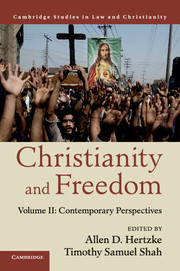Book contents
- Frontmatter
- Colophon
- Contents
- Contributing Authors
- Acknowledgments
- Introduction: Christianity and Freedom in the Contemporary World
- 1 Persecution in the Context of Religious and Christian Demography, 1970–2020
- 2 Patterns and Purposes of Contemporary Anti-Christian Persecution
- 3 Where the Spirit Leads: Global Pentecostalism and Freedom
- 4 Christianity among the Marginalized: Empowering Poor Women in India
- 5 Transnational Christian Networks for Human Dignity
- 6 The Growth and Dynamism of Chinese Christianity
- 7 Christianity and Religious Freedom in Indonesia since 1998
- 8 Christianity and Freedom in India: Colonialism, Communalism, Caste, and Violence
- 9 Vietnam: Christianity's Contributions to Freedoms and Human Flourishing in Adversity
- 10 The Challenge and Leaven of Christianity in Pakistan
- 11 Christianity and the Challenge of Religious Violence in Northern Nigeria
- 12 Copts of Egypt: Defi ance, Compliance, and Continuity
- 13 Between the Hammer and the Anvil: Indigenous Palestinian Christianity in the West Bank
- 14 Christians in the State of Israel: Between Integration and Emigration
- 15 Arab Muslim Attitudes toward Religious Minorities
- 16 They That Remain: Syrian and Iraqi Christian Communities amid the Syria Confl ict and the Rise of the Islamic State
- Index
5 - Transnational Christian Networks for Human Dignity
Published online by Cambridge University Press: 05 February 2016
- Frontmatter
- Colophon
- Contents
- Contributing Authors
- Acknowledgments
- Introduction: Christianity and Freedom in the Contemporary World
- 1 Persecution in the Context of Religious and Christian Demography, 1970–2020
- 2 Patterns and Purposes of Contemporary Anti-Christian Persecution
- 3 Where the Spirit Leads: Global Pentecostalism and Freedom
- 4 Christianity among the Marginalized: Empowering Poor Women in India
- 5 Transnational Christian Networks for Human Dignity
- 6 The Growth and Dynamism of Chinese Christianity
- 7 Christianity and Religious Freedom in Indonesia since 1998
- 8 Christianity and Freedom in India: Colonialism, Communalism, Caste, and Violence
- 9 Vietnam: Christianity's Contributions to Freedoms and Human Flourishing in Adversity
- 10 The Challenge and Leaven of Christianity in Pakistan
- 11 Christianity and the Challenge of Religious Violence in Northern Nigeria
- 12 Copts of Egypt: Defi ance, Compliance, and Continuity
- 13 Between the Hammer and the Anvil: Indigenous Palestinian Christianity in the West Bank
- 14 Christians in the State of Israel: Between Integration and Emigration
- 15 Arab Muslim Attitudes toward Religious Minorities
- 16 They That Remain: Syrian and Iraqi Christian Communities amid the Syria Confl ict and the Rise of the Islamic State
- Index
Summary
Imago Dei is the Christian theological view that all people are made in the image and likeness of God and thus have surpassing equal worth and dignity. It gained prominence in the late Roman Empire when Christianity began to offer a broad critique of common practices that we now see as unjust, cruel, or exploitative – such as slavery, sexual coercion, and indifference to the poor. It was in these arenas that the gulf between Christian dignity and societal practices seemed most glaring. In his chapter on the Christian responses to this gulf in late antiquity (Volume 1), Kyle Harper documents how the idea of universal dignity provided the underpinning and fulcrum for the later development of human rights in the modern era. In other words, he shows how the liberal revolutions of the eighteenth century proclaiming the “universal rights of man” are inconceivable without the concept of all humans as beings of incomparable worth and value, made in the image and likeness of God. To be sure, Christian-influenced societies fall short of this ideal, sometimes egregiously so. But as Harper and other contributors to these volumes show, Christianity carries deep in its DNA this radical notion of universal dignity, which serves as a challenge or rebuke to societal conditions and practices of the age.
What we find stunning is the resonance between the concerns raised by Christians in the ancient world and those expressed through global Christian networks in the twenty-first century. Today we see campaigns against human trafficking, sexual coercion, slavery, poverty, illiteracy, religious persecution, exploitation, violence, and war – echoing and expanding on the early social witness of Christians in the ancient world. But today these are global campaigns fueled by the resources of transnational Christian networks. The momentous globalization of Christianity marries the idea of dignity with the striking capacities of transnational Christian networks of communication, solidarity, and assistance. This chapter focuses on the global impact of the Christian ethic by examining some of its most important contemporary initiatives. We will see how the Christian DNA reaches across the globe, magnified by considerable resources and unparalleled transnational linkages.
FRAMEWORK FOR UNDERSTANDING THE ROLE OF GLOBAL CHRISTIAN NETWORKS
One of the driving factors in the emergence and clout of international Christian networks has been the tectonic shift of the Christian population to the developing nations of the Global South.
- Type
- Chapter
- Information
- Christianity and Freedom , pp. 133 - 160Publisher: Cambridge University PressPrint publication year: 2016



